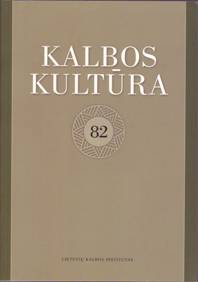Kalbos taisymai ir kalbinis pasitikėjimas: sociolingvistiniai nuostatų tyrimai
Language errors and linguistic self-confidence: a sociolinguistic research into linguistic attitudes
Author(s): Loreta Vaicekauskienė, Vaida ŠvežaitėSubject(s): Sociolinguistics
Published by: Lietuvių Kalbos Institutas
Summary/Abstract: The paper introduces the results of research conducted in 2009 and based on questionnaires collected from 200 respondents of lower than higher education (secondary and specialised) in the age group of 18-60 years. The respondents were from three major cities of Lithuania and their neighbourhood: Vilnius, Kaunas and Šiauliai. The investigation was aimed at identifying how the concept of well-formed language and how correcting language errors influenced the respondents’ linguistic self-confidence. Differently from traditional studies focusing on the norm, the present investigation presupposes that for ordinary language users, well-formedlanguage is not confined to grammatically correct language and that linguistic selfconfidenceshould be determined by other factors not limited to the knowledge of language rules.The results of the investigation have shown that the representatives of the above social group give a fairly high evaluation to their own language skills, especially speaking, and a well-formed language for them is fluent, free language which might be grammatically acceptable but could also be ungrammatical. At the same time, it can be seen that linguistic self-confidence might be reduced by language errors which are corrected: the respondents whose language was corrected in situations with an asymmetric distribution of power (e.g. the corrections were made by teachers), expressed less positive attitudes towards their own skills. The conclusion is supported by preliminary data obtained from television and radio journalists of Lithuania.
Journal: Bendrinė kalba (iki 2014 metų – Kalbos kultūra)
- Issue Year: 2009
- Issue No: 82
- Page Range: 235-252
- Page Count: 18
- Language: Lithuanian

